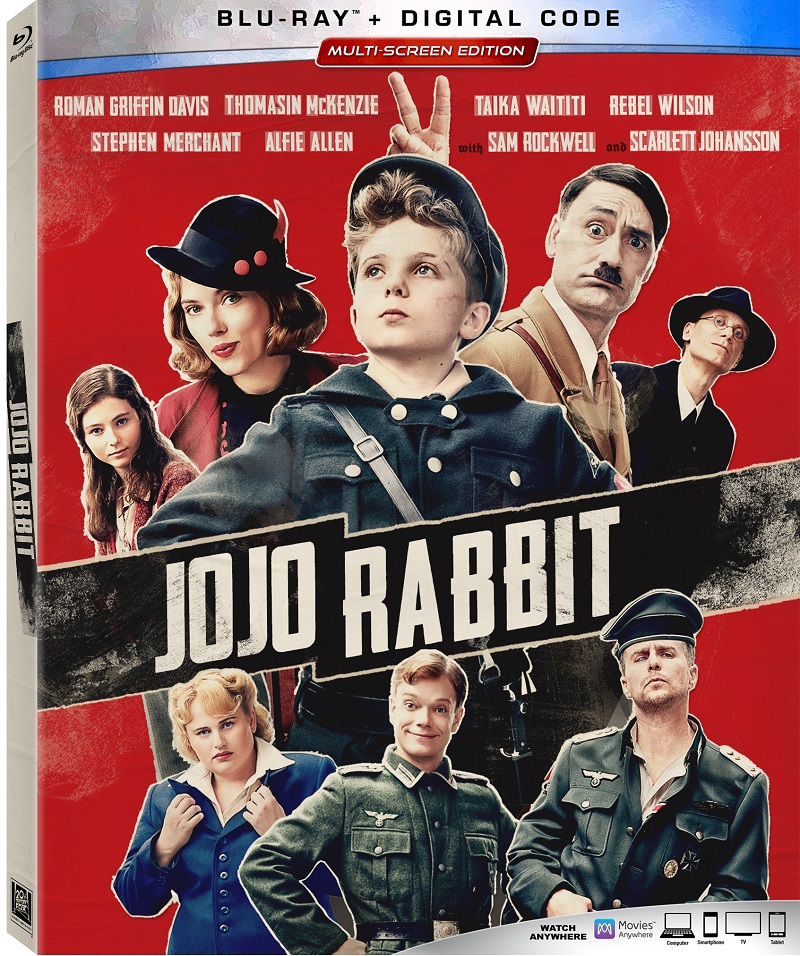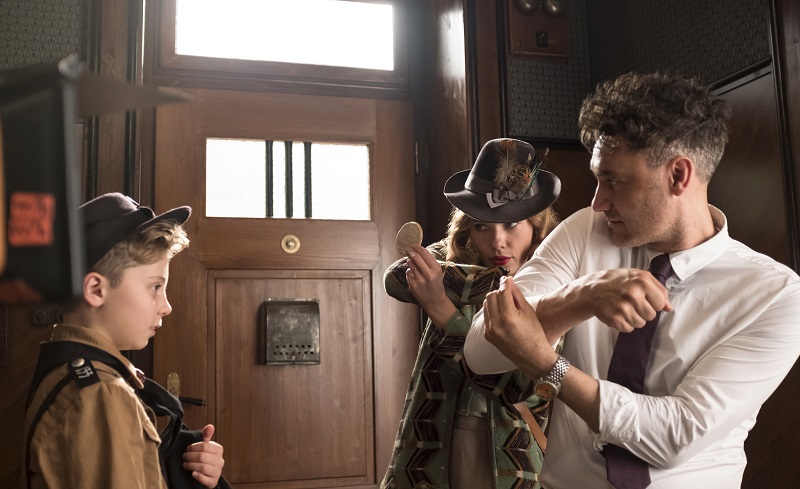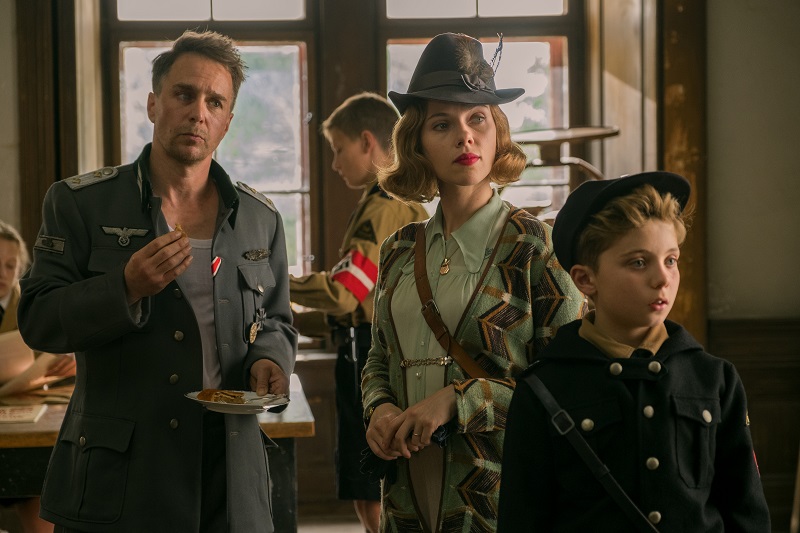Whoever thought that a little German boy having an imaginary friend who was Adolf Hitler could make its wide-spanning cultural piercing points with layers of rich comedy … well, that person is a genius. That word gets tossed around frequently in Hollywood, but proof of Taika Waititi’s cinematic clairvoyance has arrived on Blu-Ray, DVD and digital download—Jojo Rabbit.

Here in America, that “greatest generation” must be scratching their collective heads at the resurgence of Nazism in this country. Didn’t we go to war (and win) over those racist xenophobes? Whether M*A*S*H or Doctor Strangelove or: How I Learned to Stop Worrying and Love the Bomb or even Team America: World Police, comedy has been a pitch perfect source to deliver a pointed character attack on the institution of believing that one race should sit atop the human heap. Specific issues can be addressed head-on with their absurdity serving as both the comedy and the horror of this reality. As anti-Semitism and Nazi-like themes return to our society, Jojo Rabbit sends a bullet full of truthful optimism straight between their eyes.
Waititi’s wizardry is not confined to adapting the screenplay, which won him an Academy Award. It’s his stellar aptitude with directing veterans (such as Scarlett Johansson, an Oscar nominee for this role) and a child actor (Roman Griffin Davis) as well as the supporting ensemble. They are led by Oscar winner Sam Rockwell, Rebel Wilson and a revelatory performance by Thomasin McKenzie, as the young Jewish girl who the titular boy’s mother has hidden in her attic. This rocks Jojo’s world and firmly puts his previously held contention that Nazism is the right way of life to the test. Is he just a kid, playing in a war uniform? Or is he truly a part of the so-called Hitler Youth that has him so fond of the big guy that he is the embodiment of his imaginary friend?
Waititi masterfully shows us the world of Germany, circa World War II, through the eyes of a little boy. The thing is, the adults in his landscape are a means to an ends for the storyteller. He weaves this web so that they bring their own baggage and personal issues to Jojo’s world and he dissects it in such a manner that it is seen for what it really is. Hard to hide a person’s truth to a 10-year-old. As such, his mother, Rosie, tries to shield her son from the almost revolutionary work she is doing outside the home. Hiding a Jew in her attic is one thing, but her nefarious activities (according to the Nazi party) have Johansson’s character serving as the emblem of justice and free will—something sorely missing from Hitler’s Germany (and one could argue the current USA).
Rebel Wilson and Sam Rockwell are two absolutely zany incarnations of folks who pushed the Nazi agenda in World War II Germany. Rockwell is charged with turning the German youth into fighting warriors of the (near) future. He does so with a flamboyant flair that is insanely humorous and firmly tethered to this world that Waititi has crafted. His Captain Klenzendorf seems to realize the madness that he is extolling, yet in the following orders universe of Nazism, what is he to do? Well, one could drink constantly, and occasionally accessorize his uniform with face makeup and other assorted feminine wares. Rockwell has a ball, and so too do we. Wilson’s Fraulein Rahm utters lines like, “boys, let’s go burn some books!” with a blind delight that is ridiculous because we the audience knows it is. Yet she delivers it with such passion that one can see why a gaggle of Nazi youth would respond with such zeal. These two actors embody the fighting German, particularly towards the end of the war when it started to become obvious that the Nazi dream was quickly becoming a nightmare.
Johansson is divine and portrays the single mother with compassion, yet this is no ordinary mother. This is no ordinary time. She allows her son to pursue his Nazi dress-up and games, all while hiding a Jewish girl in her attic. The actress straddles the line of keeping her son in the dark and trying to elicit his understanding about how the world should work and not how he is being told it does work. She’s sublime. So too is the entire supporting cast, from Stephen Merchant to Alfie Allen.

Both Davis and McKenzie are true finds. Both exhibit a command of the material that is three times their youthful disposition. These are serious times that they are embodying, yet there is a firm flair for the absurd that Waititi interjects into every single frame. Both actors are up for the game and to watch them interact is a slow lesson in acceptance, the price of fear mongering and how at the end of the day—we are all just human beings. We all bleed when you cut us. We all cry when we lose someone dear. We are one.
Waititi, as actor, is the perfect combination of crazy and intense fortitude that embodies Hitler. He has a youthful verve to him that fits being an imaginary friend to a ten-year-old. Yet, he is still very much the Fuhrer. His interaction with Jojo is pure perfection. It is exactly what a make believe friend should be, and yet we the audience must stare at this beautiful friendship, where one of them looks like Adolf Hitler. It is such a fantastical subversive dramatic tool that the writer-director utilizes and in his own hands, it comes off as pure brilliance.

As a director, he has a command that is innate. As we saw with Thor: Ragnarok, which was the best of the Thor movies, he paints a canvas with colors and characters that literally pop off the screen. Heading into Jojo Rabbit, I wondered how he would be able to keep that thread alive with such a potentially dark storyline. The helmer did it, though, and managed to bring light to where there is nothing but darkness. One can see why he was drawn to a story about a young boy living in World War II Germany who has Hitler as an imaginary friend.
Given that Jojo Rabbit was his baby from beginning to end, the Waititi-centric bonus features were my first stop.
Inside Jojo Rabbit is a fantastic featurette that gives just the right amount of time (almost 30 minutes) to the making of the movie and entertains while it enlightens. There’s an artistic flair to this bonus feature that befits the movie and the moviemaker himself. To hear his cast and crew wax poetic about his direction aptitudes and generous nature as a fellow member of the ensemble will endear the New Zealand native’s talent even further to your heart.
There are four deleted scenes that are interesting. Each provides a front row seat into how the filmmaker saw his grand design. Why these scenes were cut will become clear after seeing the entire movie and then diving into those clips. It’s not that they’re out of place, it is more that they are some combination of repetitive, don’t push the narrative or are simply a casualty of necessity because other scenes achieved the same aesthetic.
Last, but not least. After purchasing Jojo Rabbit, watch the Oscar winning flick and then at some point later, turn on the Audio Commentary by Taika Waititi. Prepare for a wanderlust-like diving into the rabbit hole of enlightenment from the wizard of Jojo.
Film Grade: A+
Bonus Features: A-

